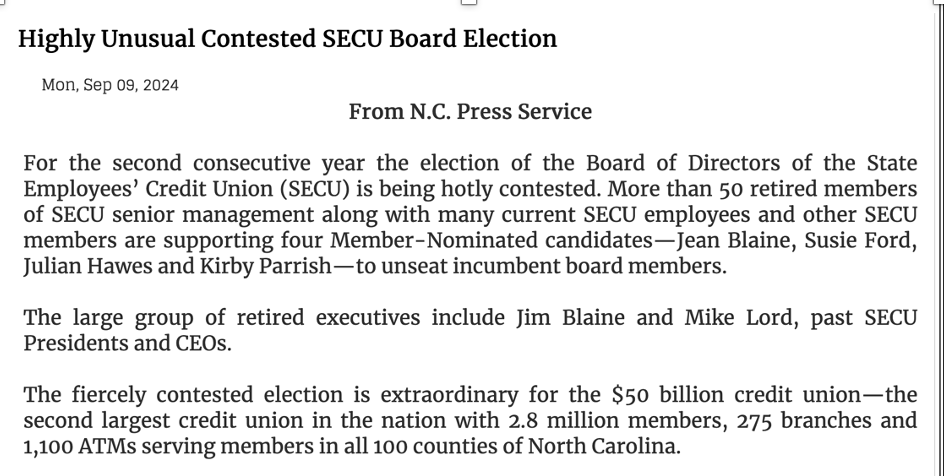As important as this November’s Presidential and congressional contests are, an even more critical election for the democratic credit union system is underway at SECU North Carolina.
For the second year, there is a contested election to the board of directors. At SECU’s October 2023 annual meeting three member-nominated candidates won seats from three incumbents. This year four seats are open. The four board selected incumbents are opposed by a four member-nominated slate that includes three former SECU senior employees.
This event is historical for SECU and the credit union system.
- It is highly unusual for any credit union, especially the second largest in America, to have an election the provides members a real choice of who will represent them.
- SECU’s size demonstrates the feasibility of this cooperative voting process. At an estimated 2.8 million members, all eligible voters received a mail-in ballot; or, they can vote virtually by going online; or finally, vote in person , at the October 8th annual meeting.
- The election demonstrates that democratic governance, versus self-nominated perpetual director selections by boards, is a viable credit union member oversight process. One member, one vote, not weighted by the percentage of ownership as in most corporations.
Entering the Final Weeks
Absentee online virtual voting ends October 1. Both sides are promoting get out the vote campaigns. The credit union has added a webpage with descriptions of the election steps. Linking to the Learn More tab presents a two minute video from SECU Chair Mona Moon explaining the board’s nomination process and the virtues of their four incumbent candidates. There is a second video with brief profiles and statements of these four, but not videos for the competing slate.
In addition to the four incumbents’ use of this “home court advantage” in presenting themselves , the credit union appears to be buying ads supporting their election on social media. Here is an example with the SECU logo:
The Opposition’s Campaign
The member nominated slate is also active with a Facebook social media site SECU for All.
The member-nominated candidates are the underdogs in this race—up against a $50 billion SECU led by a board & administration that’s spending your money to suppress members’ voices and prop up these incumbents.
Help us spread the word! EVERY SINGLE VOTE MATTERS!
This Facebook landing page shows widespread grass roots participation as well as material for supporters’ use with their friends. An additional site is a SECU for All resource with links to bios, letters sent to local news outlets and other campaign material.
The over a dozen letters to local newspapers are first hand member testimonies of support. This effort has prompted local press coverage as appears in this excerpt below.
The SECU for All site includes multiple single and joint video statements from the four candidates explaining why they are running and their top priorities. Many direct endorsements from former employees and/or current members are posted.
Other credit union CEO’s sent endorsements such as a video from Latino Credit Union’s co-founder with this intro:
The SECU member-nominated Board candidates are honored to have the endorsement of John Herrera, a true leader for the credit union cause. In addition to being a 31-year SECU member, Mr. Herrera co-founded the Latino Community Credit Union as well as serving on the NC Credit Union Commission and the National Credit Union Administration.
Real Differences In Candidates’ Positions?
The four incumbents speak in general terms about “serving all the members,” but do not offer any specific changes or priorities that members might relate to. It is certainly expected that incumbents would support the status quo.
The challengers have published five priorities:
1) End Risk Based Lending. Restore the same, best rate for every member.
2) Restore competitive savings rates for every member.
3) Restore the commitment to “Do the Right Thing” for every member.
4) Restore the local focus. Local communities, local jobs, local decisions for every member.
5) Restore the employees’ faith in fairness, equal opportunity, and quality service for every member.
In addition, they question several areas of financial performance including low share growth, the need for competitive rates, rising delinquencies and growing loan charge offs. Some of these critiques are presented in the former CEO Jim Blaine’s blog SECU-Just Asking.
A Real Choice on Real Issues
The members’ choice between the status quo versus the challengers’ positions should certainly generate more owner interest in their credit union. Who knew we could vote on the direction of our credit union?
Most importantly the election process will help clarify fundamental questions for SECU’s volunteers and senior management.
How does the leadership of a cooperative differ from traditional financial organizations? What are the candidates’ views of a credit union’s fundamental purpose and unique role, if any?
Should members have to “earn” their worth to have an equal standing for services?
Is the primary objective to serve the members’ needs or to promote the institution’s market success? As one candidate remarked in his video, “to take care of the members, we have to take care of the organization.” Are these duties separate or one?
For decades America’s competitive market dynamics for both individuals and organizations have promoted a culture of “always wanting more.” Greater growth, higher income , increased prestige and enhanced political and social power. Outcomes that often come at the expense of others.
Both candidate groups want SECU to succeed. The question the members will be able to address is how this greatness is going to be defined.





